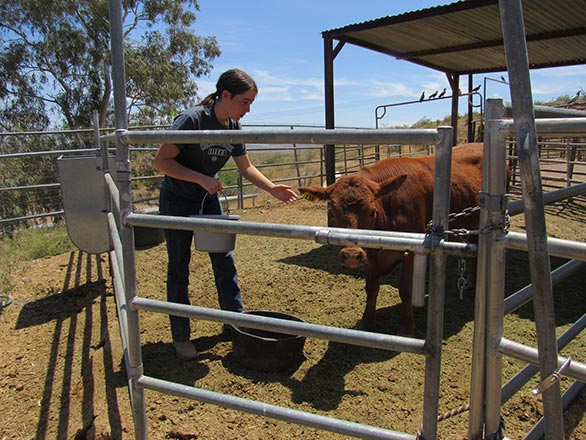Nevada 4-H offering at-home and virtual summer activities
Extension aims to keep youth engaged and learning despite COVID-19 restrictions
By Claudene Wharton
 Joy with 4-H in Clark County takes care of her animals on Day 1 of the Hygge Challenge, which challenged youth to care for an animal that day.
Joy with 4-H in Clark County takes care of her animals on Day 1 of the Hygge Challenge, which challenged youth to care for an animal that day.
In addition to the many adaptations local 4-H programs have made in Nevada communities the last couple of months amid COVID-19, the Nevada 4-H Development Program has developed a variety of activities to engage 4-H youth throughout the state during the summer months.
“Of course, due to the COVID-19 pandemic, we had to cancel all summer Nevada 4-H in-person residential overnight camps, for the health and safety of our campers, volunteers and staff,” explained Carrie Stark, Nevada 4-H program director with Extension. “We know that 4-H summer camps are a valued tradition. So in the spirit of keeping our 4-H youth connected with each other, engaged and learning, we have developed several programs that our youth can participate in whether they are in Reno, Las Vegas or Elko, for example.”
Several programs have already begun, such as the Hygge 31-Day Challenge. Hygge is the Danish practice of mindfulness and finding joy in the simple things. Each day in May, 4-H youth participating in the challenge shared a photo of themselves exhibiting this practice, using social media and the appropriate hashtag.
The Nevada 4-H Spirit Week was also held in mid-May, with 4-H youth joining in a common task or activity each day. For example, on Monday participants wore their favorite 4-H shirt and posted a photo of themselves in it, and on Tuesday, they sent a thank-you note to someone in the community who has made special efforts to help others during the pandemic. The week concluded with a 5-minute virtual dance party on Friday, led by two Nevada 4-H Teen Leaders.
There was also a STEM-learning activity for younger 4-H youth, Cloverbuds, called Cloverbot Challenge. Youth learned about a given topic via Zoom learning sessions, then built a model (such as with Legos) to illustrate what they learned, and shared a photo of their model with other participants.
Thoughtful Thursdays began in mid-May and are in full swing. These are five- to eight-minute videos by 4-H staff of volunteers on topics that might be especially helpful to teens at home coping with the pandemic, such as how to express and manage feelings, exercise tips or helping with the family’s meal planning and preparation.
A Virtual Graduation Celebration will be held May 31 - June 6, highlighting the graduating Nevada 4-H seniors and their accomplishments. Photos, plans after graduation, favorite 4-H memories and more will be shared virtually.
Beginning in June, Nevada 4-H will launch an eight-week animal science-related project focused on animal by-products. Youth don’t have to be participating in an animal science project already to participate in this project; they just need to have an interest in learning about animals. The program blends online and at-home learning, with lessons and activities focused on learning about beef, dairy, goats, sheep, swine, poultry, rabbits and bees.
A week-long project called “Engineering and Design at Home” will be offered June 15-19 for 11- to 15-year-olds. Students will be challenged to develop a purposeful/useful artifact from reclaimed materials, while exploring their creative abilities and reducing their consumption and waste production. The week will include online learning and sharing sessions, and participants will need to dedicate about three hours a day to creating their project. Participants will share their completed projects with each other, friends and family online via a Zoom session at the end of the week, and awards in various categories will be presented.
“So much of education today is about rote memorization and standardized testing,” said Sarah Monique Somma, Extension’s Clark County 4-H STEAM coordinator. “But if you can’t actually do or apply what’s on the test in real life, is it useful? In this design camp, students will be given an opportunity to show not only what they know but what they can do in a creative way. The engineering and design process facilitates authentic learning, creativity, collaboration, critical thinking and communication.”
Also June 15-19, the 4-H Pledge Challenge will take place, where 4-H youth will post photos and/or writings each day on the ways they are exhibiting the four “Hs” during the pandemic: Heart (things they are doing to show love and generosity), Head (creative ways they are overcoming challenges), Hands (things they are doing to help others), Health (ways they are staying healthy).
More projects are in the works for July, including a Virtual Camp Out, a State Communications Contest, a Monday Night Dinner activity and more.


